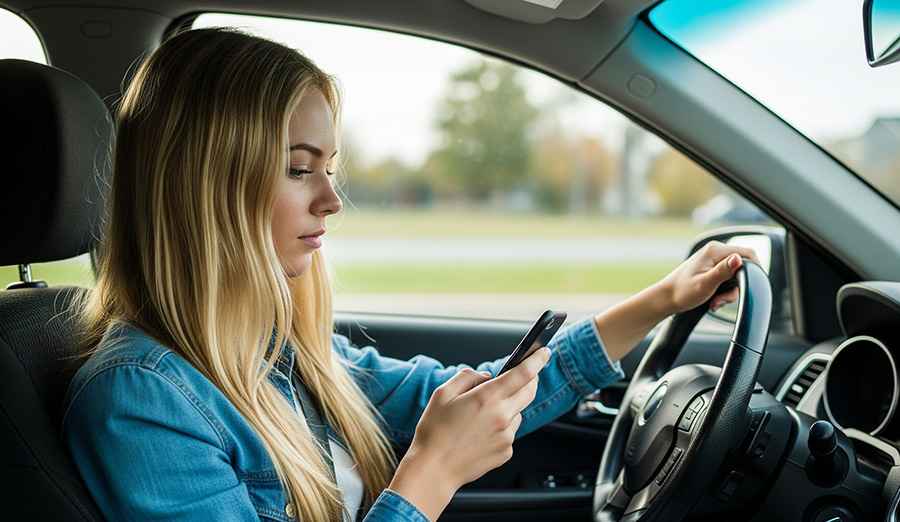Teens and Distracted Driving: Keeping Young Drivers Safe
Getting your license as a teenager is like this huge milestone - freedom, independence, all that good stuff. But honestly? It's also when things can go really wrong, really fast. Teen drivers already crash way more than any other age group, and when you throw in texting, Snapchat, or even just having friends in the car, the danger just shoots through the roof.

Parents are constantly worried about this stuff, and teens sometimes think they're invincible behind the wheel. But dealing with teens and distracted driving means actually understanding why it happens and figuring out real ways to build better habits.
Here's what both parents and teens need to know about keeping young drivers safe - because nobody wants to get that phone call that every parent dreads.
Why Teens Are Just More Likely to Crash
Look, teen drivers don't crash more because they're bad people or anything. They crash more because they're basically learning on the job while their brains are still developing. That's just science.
Most teens have been driving for like, what, a few months? Maybe a year? They haven't had enough time behind the wheel to develop those automatic reactions that experienced drivers have. When something unexpected happens, they just don't know how to respond yet.
Add in the pressure to stay connected with friends and respond to every text immediately, and you've got a recipe for disaster.
The statistics are pretty scary. Teen drivers are almost three times more likely to be in a fatal crash than drivers over 20. And when you look at crashes involving distractions specifically, teens are way overrepresented. It's not because they're trying to be reckless - they just haven't learned how dangerous distractions really are.
What Actually Distracts Teen Drivers Most
Phones are obviously the big one. Texting, checking Instagram, responding to group chats - teens feel like they have to be available 24/7, even when they're driving. But it's not just social media. Even using GPS apps can be distracting when you're still learning how to drive.
Having friends in the car is actually a huge distraction that people don't talk about enough. When it's just one friend, it's usually okay. But when you've got three or four teenagers in a car, things get loud and chaotic fast. Everyone's talking, someone's messing with the music, somebody in the back is doing something stupid to make everyone laugh.
Then there's all the basic stuff - eating while driving, adjusting the radio, putting on makeup, looking for something in your backpack. For experienced drivers, some of this stuff is pretty automatic. For teens who are still concentrating hard just to stay in their lane, any distraction can be too much.
What Happens When Things Go Wrong
The obvious consequence is crashes, and teen crashes are more likely to be serious or fatal. Young bodies might bounce back from injuries better, but car accidents can still cause permanent disabilities, brain injuries, or death. That's the harsh reality nobody wants to think about.
But even if you're lucky enough to avoid a serious crash, getting caught driving while distracted can mess up your life in other ways. Fines, points on your license, having your license suspended - all of that affects your ability to get to work or school.
Insurance premiums go up too, and when you're a teen, they're already pretty expensive. Get a ticket for distracted driving or cause an accident, and your parents might not be able to afford to keep you on their policy anymore.
The worst part though is when someone gets hurt because of your mistake. That emotional weight of knowing you caused someone else's pain or changed their life forever - that's something that sticks with you way longer than any fine or court date.
How Teens Can Actually Stay Focused
The simplest thing is just putting your phone somewhere you can't reach it while driving. Not just face down on the passenger seat where you can still see it light up, but actually in your backpack or glovebox where you can't grab it at red lights.
There's apps that can help too. Some will automatically silence notifications when they detect you're driving, others will send auto-replies to texts letting people know you're behind the wheel. Your friends might give you crap about it at first, but they'll get used to it.
Be honest about passenger limits. If having multiple friends in the car makes you nervous or distracted, it's okay to say no. Real friends will understand, and the ones who don't aren't worth risking your life over.
What Parents Can Do to Help
Set clear rules from day one and actually stick to them. If you say no phones while driving, mean it. If you say only one passenger for the first six months, don't cave when they beg to take their whole friend group to the movies.
Model good behavior yourself. If you're always texting while driving or taking calls, your teen is gonna think it's fine for them to do it too. Kids pick up on what you do way more than what you say.
Have real conversations about this stuff. Don't just lecture them about safety - show them videos of real crashes, share statistics, talk about people you know who've been hurt in accidents. Make it real for them.
Keep Those Keys and Keep Them Safe
Distracted driving is honestly one of the biggest threats teen drivers face, but it's also totally preventable. It's about building good habits early and understanding that driving isn't just another thing you can multitask through.
We can definitely reduce the risks of teens and distracted driving, but it takes effort from everyone - teens, parents, and communities working together to keep young drivers safe.